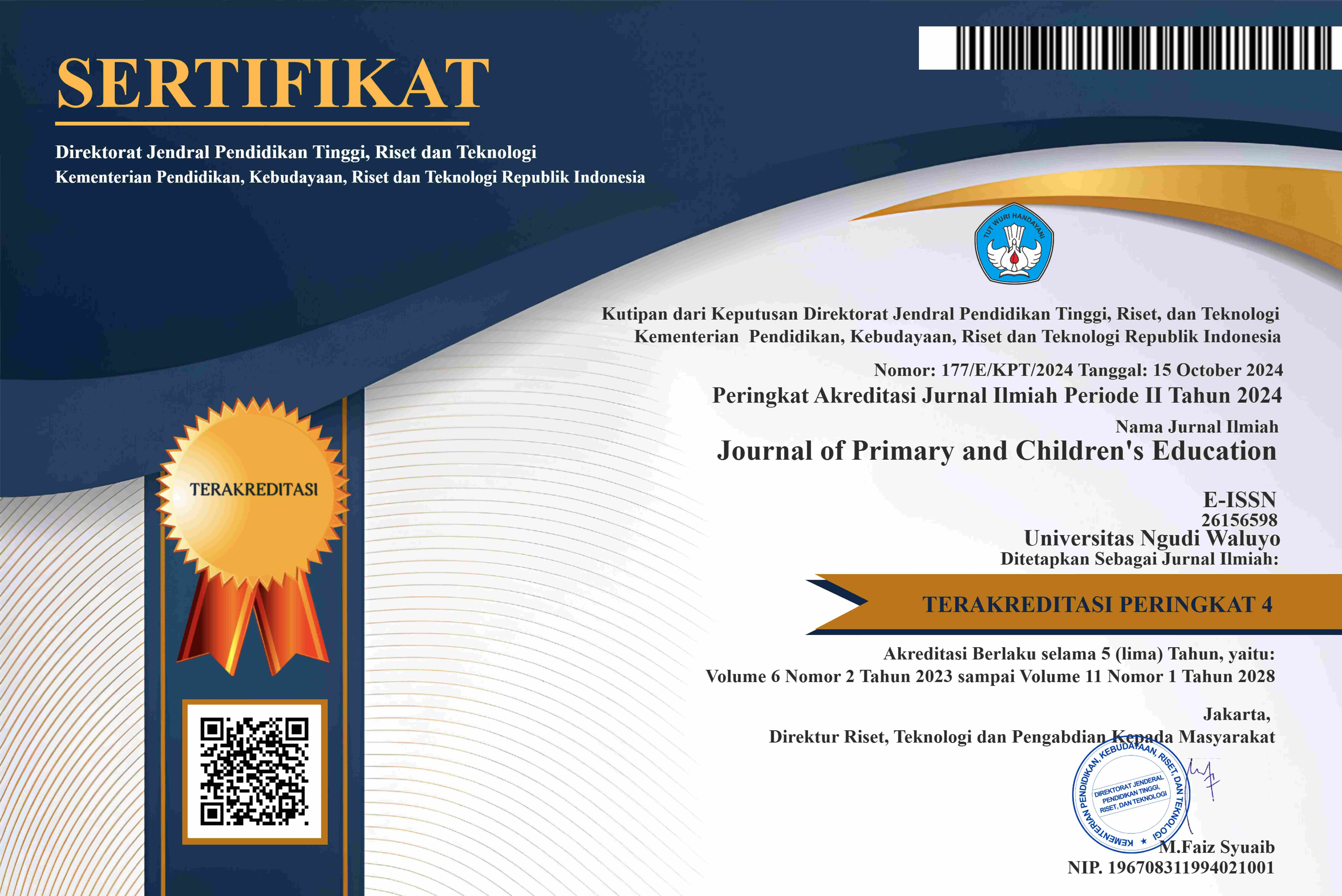PENANAMAN KARAKTER DISIPLIN MELALUI EKSTRAKURIKULER PENCAK SILAT DI SD MUHAMMADIYAH 11 SEMARANG
DOI:
https://doi.org/10.35473/jnctt.v3i2.394Abstract
Character education is one of the efforts to instill noble character values in order to become a better person. It can be seen that the cultivation of this noble character is the foundation of the nation's character. But in reality that the character of the present age is in a phase of concern. This can be seen in many problems which focus on the loss of sublime characters that are not well embedded. So that character planting needs to be done early on through family, school, community and government. One of them is through the planting attitude of habituation which is done in schools with good aims that are closely related to the character of discipline. Which can be embedded either through training activities, habituation through anything, for example with pencak silat extracurricular. Therefore, researchers try to analyze the characteristics of any discipline that is embedded in pencak silat extracurricular activities. Therefore, this study analyzes the characters found in pencak silat extracurricular activities with a focus on disciplinary characters at SD Muhammadiyah 11 Semarang. Where the character value has been instilled in by the teacher since the low class by requiring students to follow pencak silat extracurricular activities starting from class 3-5. Therefore, researchers use a qualitative approach. In this study using data collection techniques that are needed is by observation, interview and documentation. Based on the results of research that students have shown aspects of the character of discipline through pencak silat extracurricular activities and habituation in SD Muhammadiyah 11 Semarang.
References
Arumningsih, Asih. 2013. Peranan Guru PKn Dalam Meningkatkan Kedisiplinan Siswa Melalui Buku Saku Tata. Skripsi Semarang: Fakultas Pendidikan Ilmu Pengetahuan Sosial PGRI Semarang. (tidak diterbitkan).
Desmita. 2017. Psikologi Perkembangan. Bandung: PT. Remaja Rosdakarya.
Fudyartanta ki. 2012. Psikologi Permkembangan. Yogyakarta: Pustaka Pelajar
Kamus Bahasa Indonesia. 2008. Jakarta: Pusat Bahasa Departemen Pendidikan Nasional.
Koesoema, A Doni. 2010. Pendidikan Karakter (Strategi Mendidik Anak di Zaman Global). Jakarta: Grasindo
Kriswanto, Erwin Setyo. 2015. Pencak Silat. Yogyakarta. Pustaka Baru Press.
Lickona, Thomas. 2013. Pendidikan karakter. Bandung: Nusa Media
Maryati. 2007. Tanya Jawab Tentang Pengembangan Diri Di Sekolah. Semarang: CV Ghiyas Putra.
Mulyasa. H.E. 2011. Manajemen Pendidikan Karakter. Jakarta: PT Bumi Aksara.
Ma’mur Asmani, Jamal. 2013. Buku Panduan Internalisasi Pendidikan Karakter di Sekolah. Jogjakarta: DIVA Press.
Mulyana. 2013. Pendidikan Pencak Silat Membangun Jati Diri dan Karakter Bangsa. Bandung: Remaja Rosdakarya.
Moloeng, Lexy J. 2014. Metode Penelitian Kualitatif. Bandung Remaja Rosdakarya Offset.
Naim, Ngainun (2012) Character Buliding Optimalisasi Peran Pendidikan dalam Pengembangan Ilmu & Pembentukan Karakter Bangsa. Jogjakarta : Ar- Ruzz Media
Ngatiyono. 2007. Pendidikan Jasmani dan Kesehatan. Solo: Tiga Serangkai Pustaka Mandiri.
Purwanto, ngalim. 2009. Ilmu pendidikan teoritis dan praktis. Bandung: PT. Remaja Rosda Karya.
Sucipto. 2009. Pencak Silat. Jakarta: Universitas Terbuka.
Sugiyono. 2013.Metode Penelitian Pendidikan. Bandung: Alfabeta.
Tu’us Tulus. 2008. Peran Disiplin pada Perilaku dan Prestasi Siswa. Jakarta: Grasindo.
Undang-undang republic Indonesia nomor 20, sistem pendidikan nasional. 8 juli 2003. Lembaga Negara Indonesia tahun 2003 nomor 4301. Jakarta.
Yusuf Syamsu LN. 2012. Anak & Remaja. Bandung: PT. Remaja Rosdakarya.
Published
How to Cite
Issue
Section
License
Copyright notice:
- Authors retain copyright and grant the journal right of first publication with the work simultaneously licensed under Creative Commons Attribution License that allows others to share the work with an acknowledgement of the work's authorship and initial publication in this journal.
- Authors are able to enter into separate, additional contractual arrangements for the non-exclusive distribution of the journal's published version of the work (e.g., post it to an institutional repository or publish it in a book), with an acknowledgement of its initial publication in this journal.
- Authors are permitted and encouraged to post their work online (e.g., in institutional repositories or on their website) prior to and during the submission process, as it can lead to productive exchanges, as well as earlier and greater citation of published work (The Effect of Open Access)







